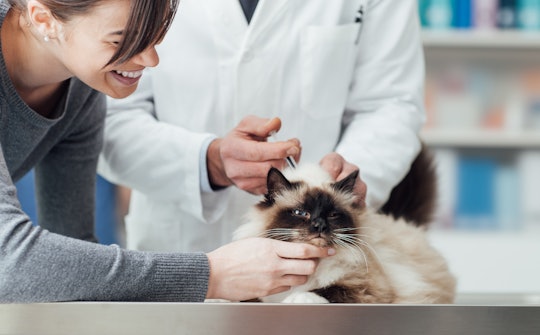Life

Happy Take Your Cat To The Vet Day — Here's Why It's So Important
It seems like there’s a “day” for everything these days. Important holidays are to be celebrated, like National Margarita Day or National Ice Cream Day (my two favorites), but another important “holiday” that’s near and dear to my animal-loving heart is Take Your Cat to the Vet Day. Yep, Aug. 22 is Take Your Cat to the Vet Day, and it’s so important. Most people think that if their cats are indoor only (or even those that are outdoor cats), then they don’t need to go to the vet as much as their furry domesticated counterparts like dogs do. And that couldn’t be more incorrect. I spoke with a veterinarian to see why it’s so important that your feline friends get as much TLC from their doctors as dogs (and humans) do.
According to Dr. Jacqui Braer, a veterinarian in Southwest Virginia, it’s important to take your cats to the vet yearly “because that may be the difference between treating a disease early versus too late. Cats are very stoic and hide that they aren’t feeling well until they can’t anymore. I recommend yearly blood work starting around 8 or 9 years old," she tells Romper. "Cats are prone to kidney disease and hyperthyroidism, among other things. Yearly blood work will help to fish those things out so early treatment is available. Dental care is also very important and checking their mouths often will help to prevent dental disease and allow for prompt cleaning.”
Braer says your cats should be seen about once a year until they hit 10 years old, and then they should be seen twice a year. At these exams, “a full exam should be done from the tip of their nose to the tip of their tails, checking eyes, nose, ears, and mouth for signs of infection,” she says.
She adds the veterinarian should also be listening to your cat's heart and lungs for any signs of abnormalities, and feeling lymph nodes throughout their body. A vet will also check your cat’s abdomen for any “enlarged organs, possible masses, etc.,” and check their joints for arthritis and pain, as well as their skin for signs of parasites or infections. And in addition to all of that stuff, they also make sure their coats look healthy, and check out their temperature, heart rate, oxygen, and gum color to make sure everything is on the up and up. “I always recommend checking stools for parasites, especially for those that go outside,” Braer says. You never know what kind of parasites and bacteria your cat can pick up from outside. Whew. That’s a lot of stuff to be checked out — thankfully it’s once a year for younger kitties.
As far as yearly vaccinations, Braer does recommend vaccines even for indoor cats. “There is always a possibility of them getting out accidentally, or a new cat could bring in diseases into the home. The distemper combo vaccine has multiple very contagious but preventable diseases within it. Rabies is required by law, but there is always a chance a bat or other rabies carrying animal could come into contact [with your cat]."
How can you tell if your cat needs to be seen outside of their important regular checkup? Braer says their behavior will change. “They may become grouchy or hide all the time. They may also begin vomiting, not eating, and may lose weight. Any behavior change that isn’t normal should be a red flag.”
So even though your cats may not love this particular day (and will show you how much they dislike it, as they do), it’s still super important. Show them you love them by giving them the gift of health. They don’t know it yet, but it’s the best thing you can do to keep them snuggly, cuddly, and feisty for a long time. Happy Take Your Cat to the Vet Day, and get your furry baby in for a checkup as soon as possible.